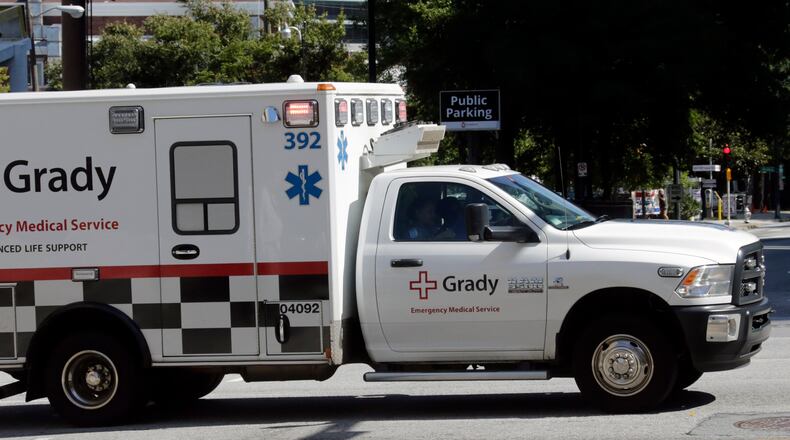Grady Health System is seeking $165 million from donors and local governments to expand its downtown campus and an AIDS treatment center.
The proposal, which comes 10 years after Grady Memorial Hospital almost shut its doors because of crippling debt, calls for the construction of a seven-story advanced surgical services center with operating and recovery rooms across the street from the main hospital building. The Ponce de Leon Center, which treats more than 6,000 people a year with HIV and AIDS, would be modernized and expanded.
Together, the projects will help lead Grady “into a new era of excellence,” said Renay Blumenthal, president of the Grady Health Foundation.
"This is a big next chapter for Grady," she said. "We cannot grow and continue to meet the needs of the community without this facility."
Fulton County Commission Chairman John Eaves said he supports the plan and that securing approval for Fulton's portion of the funding is one of his top priorities. A spokesman for DeKalb County, Andrew Cauthen, said he had no comment from DeKalb County CEO Michael Thurmond.
While those two counties contribute funds for Grady’s operating costs, Blumenthal said it’s been 25 years since the counties have given any money for capital improvements. She said she is encouraged by early conversations with potential private donors and with the governments.
Grady has reached its capacity, Blumenthal said, and needs the extra space.
“It’s thriving,” she said of the hospital. “We are at full capacity; it’s unbelievable. It’s a good problem to have.”
Chris Kane, principal at advisory and care management services firm Progressive Healthcare, said an expansion of Grady would benefit the community. He said the surgery center would bring more people with private insurance to Grady, helping the hospital’s bottom line. State-of-the-art surgical facilities can also create a halo effect for the entire health system.
And with Atlanta among the epicenters of the current HIV and AIDS outbreak, it makes sense to modernize and expand the Ponce facility, to get more people into care, he said.
“I believe it is good for Grady and good for the city,” he said. “I think this makes sense.”
No construction plans exist, Blumenthal said. She said Grady’s needs have not been a secret, and she expects community support.
“We have the land. We have a vision. We have a plan in the broad sense of the word,” she said. “The next step is monetizing it. Can we make a public-private partnership a reality?”
Tracy Atwater, a certified fundraising executive and president of nonprofit consulting firm Bridges Atwater Solutions, said she thinks they can.
“It’s an easy sell from a fundraising perspective,” she said. “Atlanta needs Grady.”
Because Grady handles so many trauma cases, routine, scheduled surgeries often get bumped from operating rooms, which are over capacity, Blumenthal said. About 13,000 surgeries are performed at the hospital each year, or about 35 each day. Now, there are 16 operating rooms at the hospital.
The surgical services center would add six dedicated operating rooms for an ambulatory surgery center, to handle some of those scheduled surgeries. It also would have dedicated rooms for gastrointestinal procedures, an outpatient imaging center and a relocated cancer center.
The moves will allow the hospital to add 52 beds.
Altogether, the project would increase clinic capacity by 45 percent and operating room volume by 25 percent. It would also improve Grady’s financial flexibility.
“Generally, Grady is very strategic about its future direction,” Blumenthal said. “We wouldn’t be doing it if it didn’t have a positive impact.”
The hospital would have to receive a certificate of need to build the new tower, but Kane said he did not anticipate any trouble getting one. Once everything is in place, Blumenthal said, construction will take between two and a half and three years.
Grady also plans to build a $38.3 million parking deck with 660 spaces for the new facility. That, Blumenthal said, will be funded by Grady.
At the Ponce center, the hospital will build out two more floors and update the building, which has not been touched since treatment models for HIV and AIDS have changed.
Without government and philanthropic support, the projects cannot be done, Blumenthal said.
“We cannot survive without community and government partners,” she said. “We literally can’t do it without them.”
Grady Memorial Hospital opened in 1892. It almost closed in 2007, hamstrung by crippling debt. Today, Grady is planning an expansion. The hospital system is at full capacity and performs 13,000 surgeries a year. A new building would add six operating rooms and other needed space.
About the Author
Keep Reading
The Latest
Featured




